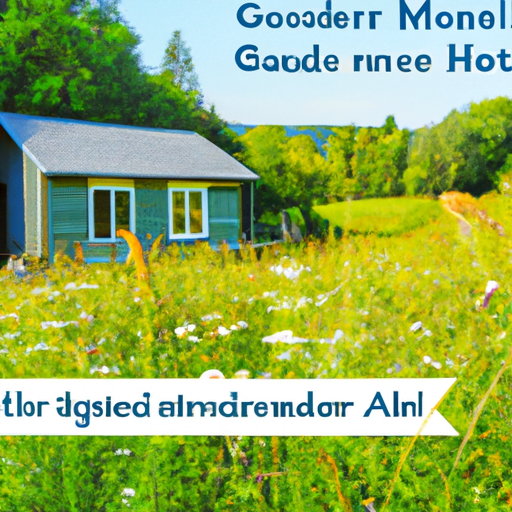So, have you ever wondered if it’s possible to live off the grid in a log cabin in the UK? It’s a pretty intriguing idea, right? Well, I have some good news for you – it is indeed possible! In fact, more and more people are choosing this alternative lifestyle to escape the hustle and bustle of city living.
Living off-grid essentially means being self-sufficient and disconnecting from the traditional utilities and infrastructure that most of us rely on. Instead, you would generate your own electricity, collect rainwater, and potentially even grow your own food. It’s a way to live in harmony with nature and reduce your carbon footprint. And what better way to do it than in a cozy and rustic log cabin?
Now, I know you’re probably wondering how you can make this dream a reality. Can you simply buy a piece of land, plop a log cabin on it, and call it home? Well, it’s not quite as straightforward as that. There are regulations and planning permissions to consider, but don’t worry – in our article, we’ll delve into all the details and guide you through the process. So, if you’re ready to learn more about living off the grid in a log cabin in the UK, keep reading!

Living off grid in a log cabin in the UK
Living off grid has become an increasingly popular concept in recent years, as more and more people are seeking a simpler and more sustainable way of life. A log cabin offers the perfect opportunity to embrace off grid living, with its rustic charm and natural surroundings. In this article, we will explore the concept of living off grid in a log cabin in the UK, and discuss the advantages, considerations, and steps involved in achieving this lifestyle.
Exploring the concept of living off grid
Living off grid refers to a lifestyle in which individuals or families are self-sufficient and do not rely on public utilities such as electricity, water, and gas. Instead, they generate their own energy through renewable sources, manage their own water supply, and find alternative methods for waste disposal. The aim is to minimize dependence on external resources and reduce the impact on the environment.
Advantages of living off grid in a log cabin
Living off grid in a log cabin offers a myriad of advantages. Firstly, a log cabin provides a connection to nature and a sense of tranquility. Surrounded by trees and wildlife, you can experience the beauty of the natural world right at your doorstep. Additionally, log cabins are highly energy-efficient, as the wood acts as a natural insulator, keeping the cabin warm in winter and cool in summer without heavy reliance on heating and cooling systems.
Furthermore, by living off grid, you have the opportunity to reduce your carbon footprint. Generating your own energy through renewable sources such as solar panels or wind turbines ensures that you are not contributing to the use of fossil fuels and greenhouse gas emissions. This not only benefits the environment but also helps to combat climate change.
Finding the ideal location for your log cabin
When considering living off grid in a log cabin, the location is key. The UK offers a variety of landscapes, from rolling hills to picturesque coastlines, which can provide the perfect backdrop for your sustainable lifestyle. It is important to choose a location that receives ample sunlight for solar energy production and has access to water sources such as rivers or wells.
Additionally, consider the proximity to necessary amenities such as medical facilities, grocery stores, and educational institutions. While living off grid may involve a certain level of self-sufficiency, it is always beneficial to have these services within reach.
Preparing the land for your off grid log cabin
Once you have chosen the ideal location, you will need to prepare the land for your off grid log cabin. This includes clearing the area of vegetation, leveling the ground, and ensuring that it is suitable for building. Consulting with professionals such as architects or builders can provide valuable insights for site preparation and cabin design.
Choosing the right log cabin design
When it comes to choosing a log cabin design, there are countless options available. Consider the size of your family, lifestyle requirements, and budget. Look for designs that are energy-efficient and sustainable, with features such as double-glazed windows and insulation. This will help to reduce energy consumption and maintain a comfortable living environment throughout the year.
Installing essential off grid systems
Living off grid requires careful planning and installation of essential off grid systems. These can include solar panels for electricity generation, rainwater harvesting and filtration systems for water supply, and composting toilets for waste disposal. It is essential to consult with professionals to ensure that these systems are installed correctly and efficiently.
Harvesting and utilizing renewable energy sources
Renewable energy sources play a vital role in off grid living. In the UK, solar energy is a popular choice due to the abundance of sunlight, especially during the summer months. Installing solar panels on the roof of your log cabin allows you to harness the power of the sun and generate electricity for your daily needs. Wind turbines can also be considered if you have a windy location, as they can generate a substantial amount of energy.
Managing water supply and waste disposal
Being self-sufficient in terms of water supply is essential for off grid living. Rainwater harvesting systems can collect and store rainwater, which can then be treated and used for various purposes such as bathing, cooking, and watering plants. It is important to install a filtration system to ensure the water is safe for consumption.
In terms of waste disposal, composting toilets offer an eco-friendly solution. They use organic materials to break down waste into compost, which can then be used as fertilizer for plants. This eliminates the need for traditional sewage systems and minimizes pollution.
Maintaining self-sustainability in your log cabin lifestyle
Living off grid requires a commitment to self-sustainability. This includes growing your own food through vegetable gardens or greenhouse cultivation, practicing recycling and waste reduction, and finding creative ways to conserve energy. It may take time and effort to establish these habits, but the rewards in terms of self-sufficiency and reduced environmental impact are well worth it.
Conclusion
Living off grid in a log cabin in the UK allows you to embrace a simpler and more sustainable way of life. By generating your own energy, managing your water supply, and finding alternative waste disposal methods, you can reduce your dependence on external resources and minimize your carbon footprint. The key is to carefully plan and prepare for off grid living, ensuring that your log cabin is energy-efficient, your location is suitable, and essential systems are installed correctly. So, why not take the plunge and embark on this rewarding journey of living off grid in a log cabin?





